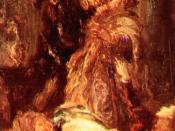Hamlet
Yet I,
A dull and muddy-mettled rascal, peak
Like John-a-dreams, unpregnant of my cause,
And can say nothing--no, not for a king,
Upon whose property and most dear life
A damn'd defeat was made. Am I a coward?
Who calls me villain, breaks my pate across,
Plucks off my beard and blows it in my face,
Tweaks me by the nose, gives me the lie i'th' throat
As deep as to the lungs--who does me this?
In Shakespeare's Hamlet, Hamlet has been saddened by
the death of his father. When he finds out that is was the
doing of his crooked uncle, Hamlet's chief goal is to
revenge the ignoble deed. This revenge, which the play is
centered upon, is hindered by Hamlet's tragic flaw and is
seen in the above passage. The flaw, hesitation, impedes
his ability to avenge his fathers death, and ultimately
results in his decline and demise.
The play opens with King Hamlet having already been
murdered. Claudius, the dead King's brother, has seized the
throne as well as the Queen's, and mother of Hamlet's, hand
in marriage. All of these events have shocked the
protagonist, Prince Hamlet, who still laments the death of
his noble father and curses his mother for marrying his
uncle with "most wicked speed, to post with suck dexterity
incestuous sheets." However, in spite of his disapproval,
Hamlet does not voice his anger by saying "but break my
heart, for I must hold my tongue." Hamlet wears "customary
suits of solemn black" and cries with the "fruitful river in
the eye" for his father and states that he acts as suck
because "within which passes show, these but the trappings
and suits of woe." Hamlet does not care about the kingdom,
he merely wants to grieve the death of his...


